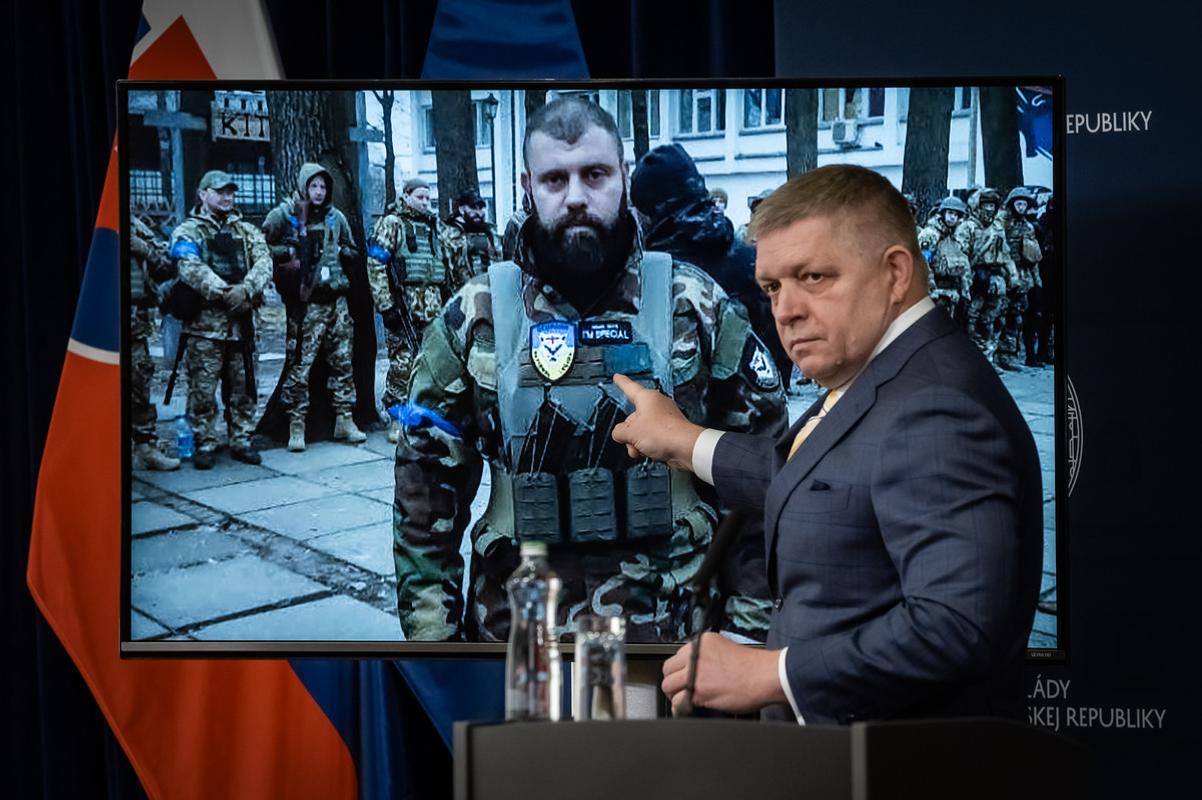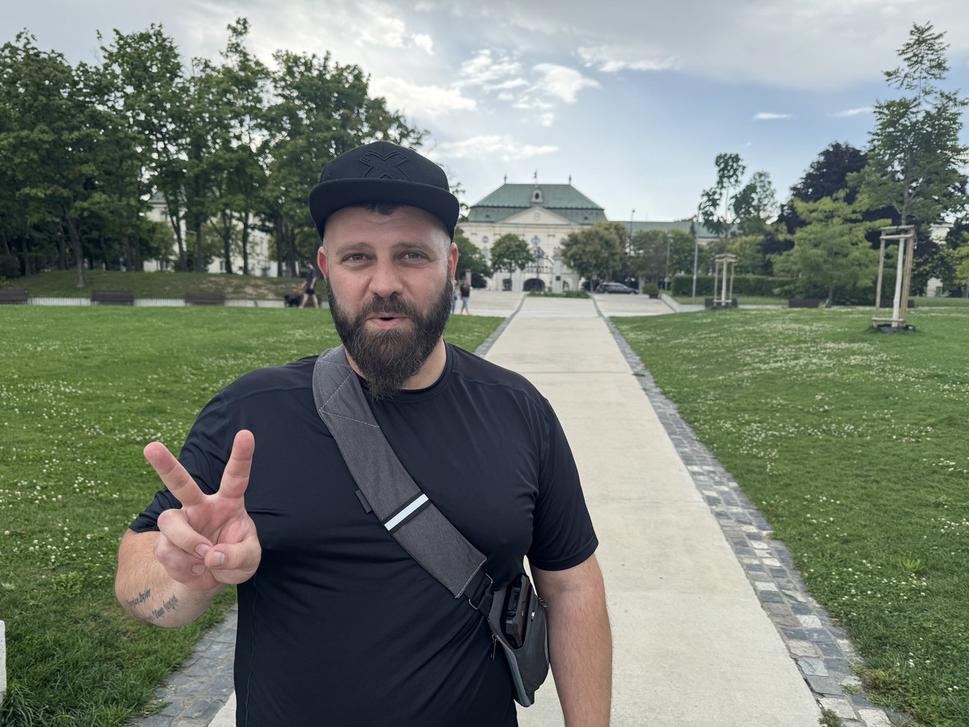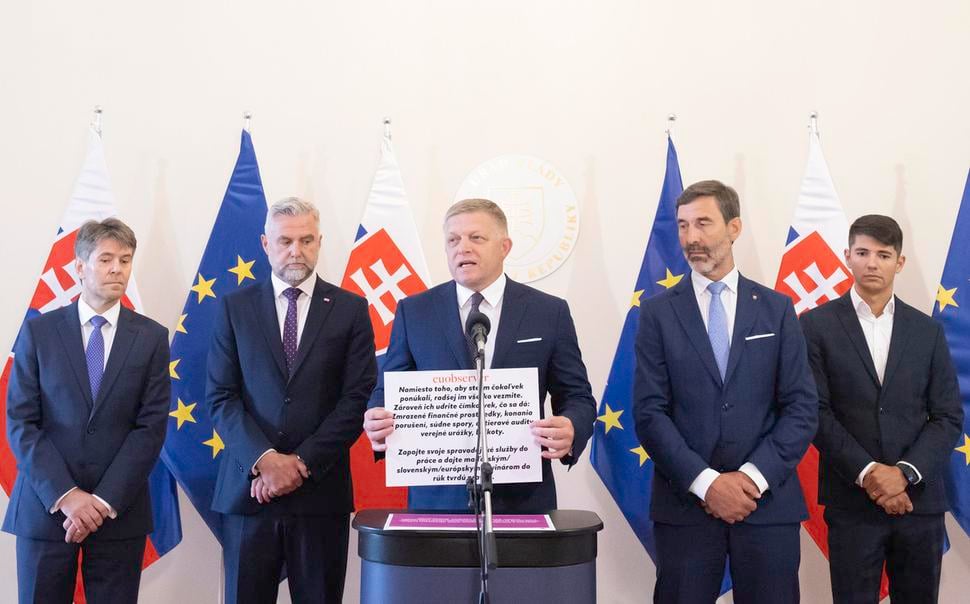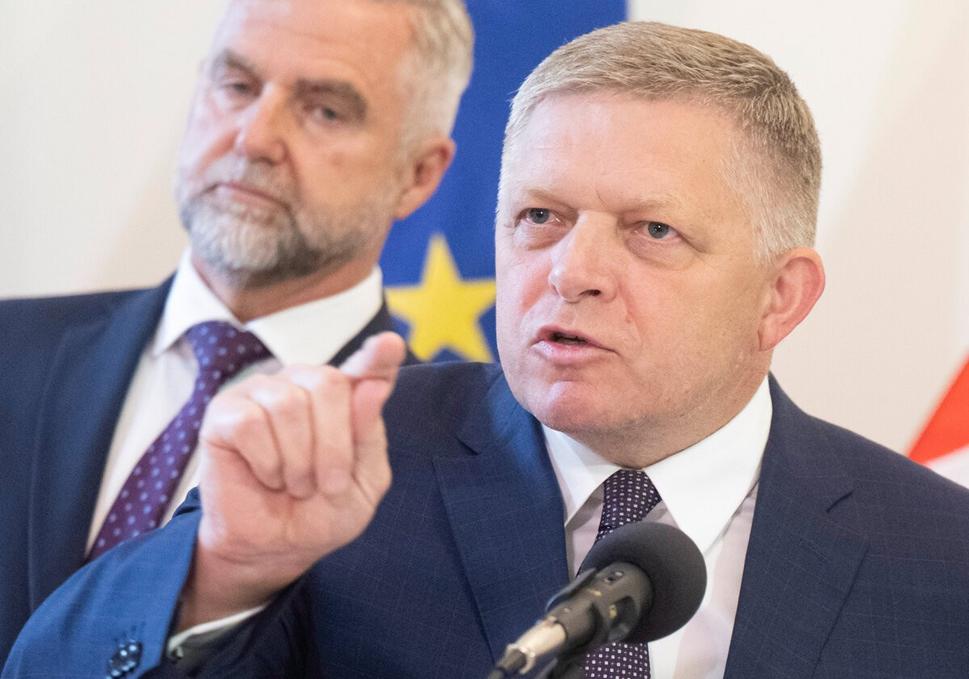This story was produced in partnership with Reporting Democracy, a cross-border journalism platform run by the Balkan Investigative Reporting Network.
On a hot afternoon in late July, Mamuka “Ushangi” Mamulashvili, a Georgian military commander accused by Slovakia’s leaders of plotting an armed coup against the goverment, sat on a park bench in central Bratislava. The spot, on Freedom Square, sits just a stone’s throw from the Government Office – the very building Fico had warned in January could be occupied by “people like him” in a violent scenario.
There was no security cordon; no police interception – just Mamulashvili chatting with Slovak war reporter Tomáš Forró, who filmed the encounter and uploaded it to social media on August 6.
The footage caused a political firestorm. It called into question not only the gravity of the January allegations – that Slovakia faced a foreign-orchestrated attempt to overthrow the state – but also whether those claims had ever been intended to withstand any scrutiny.
“If the entire story about the coup has no basis in reality, it means that the highest state officials openly lied and knowingly spread disinformation and panic,” Forró told the Sme newspaper. “There is no other possible explanation. If something had truly been threatening, there should have been an investigation, people questioned, charged, and so on.”
January’s dark warnings
On January 22, Interior Minister Matúš Šutaj Eštok announced, citing a report from Slovakia’s SIS intelligence service, that the country faced the “real threat” of a coup d’etat.
The minister spoke of earlier bomb threats, cyberattacks and “foreign instructors” manipulating street protests. Days later, Prime Minister Robert Fico, flanked by the head of SIS, Pavol Gašpar, and other senior officials, escalated the charge, naming Mamuka Mamulashvili, leader of the Georgian Legion fighting alongside Ukraine, as a chief conspirator.
“Imagine if such people occupied the building of the parliament,” Fico warned at the press conference, displaying a nearly two-year-old photograph of Mamulashvili in combat gear. The government, he claimed, had already blocked the commander’s entry into Slovakia and the EU’s wider passport-free Schengen Area.
The charge was serious; the evidence, thin. No fresh photographs, no intercepted communications, no dates or operational details – just the repeated assertion that Mamulashvili and unnamed Slovak activists were plotting violence. President Peter Pellegrini, Fico’s political ally, declared the situation “serious”. The opposition called it fear-mongering. Then, for months, silence.
The ministries and agencies that had sounded the alarm in January have offered little clarity since the footage emerged. The Interior Ministry, in a written statement, said only that “the presence of problematic individuals on Slovak territory does not mean police are not operationally monitoring them.” Gašpar’s SIS declined to comment entirely, citing operational secrecy. The Government Office referred all questions back to the Interior Ministry.
Fico himself was on holiday in Croatia when the story broke last week; reporters caught up with him in a seaside town, but he offered no substantive response.
Šutaj Eštok, who in January had claimed that Mamulashvili was “on the blocked persons list”, is now accusing “activist journalists” of spreading conspiracy theories – without explaining how the Georgian could have entered the country if his own January claim had been true.
Opposition smells political theatre
For the opposition, the coup claims never stacked up and seemed too convenient at the time.
“It was a smokescreen to stop parliament debating a no-confidence motion,” said Branislav Vančo of Progressive Slovakia, recalling how January’s coup allegations coincided with an attempt by the opposition to collapse the government.
An MP with the Freedom and Solidarity (SaS) party, Ondrej Dostál, was blunter: “The government lied, fabricated and misled. No normal person could believe peaceful protesters were about to stage a putsch.”
František Mikloško, a Christian Democrat MP, suggested Fico might not even have registered the Georgian’s later visit. “This is the world of people who want to govern without feedback. They just issue orders,” he said.
Former police chief Jaroslav Spišiak, now serving as a Progressive Slovakia lawmaker, called it the “politics of fear, politics of trolling”.
The allegations’ staging was itself remarkable. In January, the Security Council – a body meant to handle the gravest threats to national security – convened to discuss the purported plot. It recommended preventive measures, with ministers and the president speaking as if Slovakia was only days away from an armed uprising.
Yet, no arrests followed, no questioning of alleged co-conspirators took place, and no charges were filed.
Lucia Štasselová, a civic activist whose two-year-old, publicly available photograph with Mamulashvili was cited as “evidence” by coalition figures, says she has never been contacted by police.
The Georgian’s own presence in the EU’s Schengen Area – not only in Slovakia but travelling freely – would require, at minimum, a bureaucratic failure to enter a ban into the system. More likely, says human rights lawyer Miroslava Mittelmannová, it means that no such ban was ever requested.
The gulf between the January warnings and July reality leaves Slovakia with two plausible explanations – neither flattering to those in power.
One: that the coup claims were knowingly exaggerated or invented for political advantage, part of a broader narrative casting foreign-funded NGOs, the opposition and foreign partners as enemies within. Two: that the claims were accurate, but the state then failed to take even the most basic measures to neutralise the alleged threat.
Forro, who has known Mamulashvili for years, frames it starkly: “If Mamulashvili truly posed a threat to us in the winter, terrified Smer [Fico’s party] voters should now be demanding the resignation of the interior minister. If there was no threat, it was the spreading of a false alarm – and all of us together should be calling for Prime Minister Fico to resign for having promoted that lie at an official press conference.”
Regional echoes
The use of alleged coup plots as political ammunition is not unique to Slovakia. Across Central and Southeast Europe, governments have invoked claims of shadowy uprisings to justify security crackdowns or discredit the opposition.
In Serbia, President Aleksandar Vučić has repeatedly warned of foreign-backed attempts to destabilise his rule; in Montenegro, a high-profile “coup” trial against pro-Russian figures dragged on for years before convictions were overturned on appeal. Hungary’s Viktor Orbán has framed civic protests as tools of “foreign agents”, while in North Macedonia, wiretap leaks once fuelled talk of an attempted overthrow.
In each case, evidence was thin or contested, but the narrative served to rally political bases and marginalise dissent – a pattern that critics now see repeating itself in Slovakia.
Fico and his government have faced similar accusations before. Critics point to past reversals – promising to repeal a defence pact with the US, then leaving it untouched; vowing no VAT rise, then implementing one; denying he called then-president Zuzana Čaputová an “American agent” despite video evidence to the contrary.
Most recently, Fico accused the UK of meddling in the 2023 parliamentary election campaign through a British PR agency, alleging it sought to aid his main rival, Progressive Slovakia, by working with local influencers and journalists – claims the UK has rejected.
The Mamulashvili episode, though, is unusual in its visual counterpoint: a man publicly branded as a danger to the republic standing, relaxed, in the shadow of its executive offices.
It is an image the opposition is likely to revisit in the run-up to the next election campaign.
Mamulashvili has since left Slovakia, his visit having achieved – intentionally or not – the puncturing of a months-old security narrative. He says he will return when he can, as “a free man visiting a free country”.
Six months after the prime minister’s urgent warnings, the alleged coup plot has yielded no indictments, no court hearings and no public evidence – only a summer video of two men talking in the sun, the seat of government in the background, and the uneasy sense that in Slovak politics, some of the biggest threats may be the ones invented at home.
The police, for their part, say their work is ongoing, citing legal proceedings, financial inquiries and extensive operational measures. They have not disclosed any further details.
So, did Mamulashvili plot a coup? “I’ve never done any coup in Slovakia, and I’ve never thought about it,” he told Forró. “While they were accusing me, I was defending freedom and democracy – not just for Ukraine, but for Georgia, Slovakia and other countries that might face Russian aggression.”


 Slovak PM Robert Fico gestures in front of a photo of the commander of the Georgian National Legion, Mamuka Mamulashvili, during a press conference in Bratislava on Friday, January 31, 2025. (source: TASR - Government Office of the Slovak Republic)
Slovak PM Robert Fico gestures in front of a photo of the commander of the Georgian National Legion, Mamuka Mamulashvili, during a press conference in Bratislava on Friday, January 31, 2025. (source: TASR - Government Office of the Slovak Republic)
 Mamuka “Ushangi” Mamulashvili, a Georgian military commander accused by Slovakia’s leaders of plotting an armed coup against the government, with the Government Office of the Slovak Republic in the background, Bratislava. (source: Facebook - Tomáš Forró)
Mamuka “Ushangi” Mamulashvili, a Georgian military commander accused by Slovakia’s leaders of plotting an armed coup against the government, with the Government Office of the Slovak Republic in the background, Bratislava. (source: Facebook - Tomáš Forró)
 Prime Minister Robert Fico (c) with Deputy Speaker of Parliament Tibor Gašpar (second left), Chief Adviser Erik Kaliňák (r), Foreign Minister Juraj Blanár (second right) and Deputy Foreign Minister Marek Eštok (l) at a press conference on current political issues in Bratislava, Tuesday, July 29, 2025. (source: TASR - Martin Baumann)
Prime Minister Robert Fico (c) with Deputy Speaker of Parliament Tibor Gašpar (second left), Chief Adviser Erik Kaliňák (r), Foreign Minister Juraj Blanár (second right) and Deputy Foreign Minister Marek Eštok (l) at a press conference on current political issues in Bratislava, Tuesday, July 29, 2025. (source: TASR - Martin Baumann)
 Slovak PM Robert Fico (r) and Deputy Speaker Tibor Gašpar (l) during a press conference in Bratislava on Tuesday, July 29, 2025. (source: TASR – Martin Baumann)
Slovak PM Robert Fico (r) and Deputy Speaker Tibor Gašpar (l) during a press conference in Bratislava on Tuesday, July 29, 2025. (source: TASR – Martin Baumann)